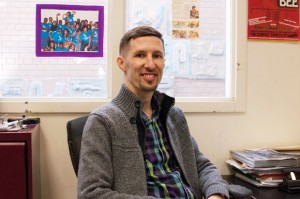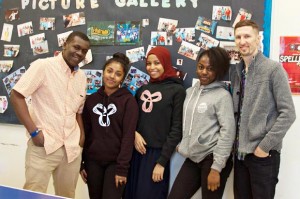Article on SBL – Yonge Street Media
Posted by admin
on February 25, 2015 at 12:26 pm



Last fall, Matt Galloway (host of CBC’s Metro Morning) was one of 3,500 people who sat down at a dinner table and listened to what his neighbours had to say about Toronto at an event called 1000 Dinners TO.
“Something pretty amazing happened last night,” he said to the audience listening to his radio show on the morning of October 8, 2014. “Across the city, people opened up their doors to friends and strangers, sharing food and exchanging ideas for how to make this city a better place.”
Galloway and the Metro Morning crew had more than 500 dinners to choose from when it came time to decide which dinner they thought would best capture the essence of the event. In the end, they chose to travel to Westview Centennial Secondary School in the Jane and Finch community to break bread with a youth mentoring group called Success Beyond Limits (SBL).
The difficulties that the residents of the Jane and Finch community face are, on at least a surface level, known to most Torontonians. According to the 2020 Toronto Strong Neighbourhood Strategy that was published by the city, the Black Creek neighbourhood where Jane and Finch meet is one of Toronto’s least livable communities. It’s an area that is in need of a significant increase in infrastructure and social program spending if the material existence of its residents is to improve.
Despite that fact, Christopher Penrose, the executive director of Success Beyond Limits, is able to say, “I can’t say I’ve experienced a more real sense of community anywhere else.”
It’s this seemingly contradictory status of Jane and Finch—and the stigma that comes with being identified as a resident of the neighbourhood—that fuelled SBL’s dinnertime conversation and the answers they had for Matt Galloway.
Thanks to the team behind 1000 Dinners and the CBC, the youth that take part in the program were able to tell the rest of the city what life is really like in their neighbourhood.
The inspiration for 1000 Dinners came from Jaime Watt, the executive chairman of Navigator Ltd., the firm most Canadians will be familiar with from its short stint last year as Jian Ghomeshi’s public relations representative. Watt learned that the Chicago Community Trust organization had commemorated its 99th anniversary by inviting Chicago’s residents to sit down for dinner and talk about the city’s future. Seeing the success of that event, which drew some 11,000 participants, Watt decided to try out the idea in Toronto.
He tasked Jamie Ellerton, a principal at a local PR firm called Conaptus Ltd., to lead the project. Ellerton helped organized the event, and he’s also one of the lead authors on the upcoming 1000 Dinners report, which will be out and available to the public in the next couple of weeks.
“One of the reasons we decided to do 1000 Dinners was to get a conversation started about what this city could be,” said Ellerton. “Given the focus of last year’s mayoralty race on who was leading in the polls, we thought one of the things that was missing from the conversation was a lack of discussion about where we wanted this city to go, what we could do to address its problems and what makes us proud to call Toronto home.”
To that end, the 1000 Dinners team decided to use the Toronto Foundation’s 2014 Vital Signs report as a frame to help guide participants’ dinnertime discussions. Everyone that took part in the event was asked to consider five questions as they ate and talked with their neighbours:
1) “Why are you proud to call Toronto Home?”
2) “How can Toronto attract and retain the best and brightest to continue creating opportunity here at home?”
3) “What is one idea that would solve a problem in your neighbourhood to make it better?”
4) “What is preventing Toronto from tackling inequities in our communities?”
5) “What should Toronto become? How do we get there?”
After the event concluded, participants were invited to answer a survey that asked those same questions. The results of that survey, which are included in the upcoming report the organization is releasing, should come as no surprise to anyone that has recently lived in Toronto.
87 per cent of participants said they were proud to call Toronto home and a majority of them—57 per cent, to be exact—cited the city’s diversity as its greatest strength.
When it came to the question of how to attract and retain talent in Toronto, 47 per cent of respondents said that affordable housing and apartments were vital. Another 43 per cent said that strong economic activity and reasonable prices for goods and services were crucial.
As for the issue that most participants wanted solved in their neighbourhood, 30 per cent said transit was something that needed to be addressed as soon as possible. Indeed, if there’s a theme that runs through the report, it’s that transit and affordable housing are on the top of everyone’s minds.
The second part of the report relates some of participants’ suggestions for improving Toronto. One of the more interesting recommendations is for the TDSB to consider creating a revenue sharing partnership between the schools in Toronto’s priority neighbourhoods and the ones in its more affluent neighbourhoods. Another recommendation proposes that voting in a municipal election be opened up to all residents above the age of 18, not just those who are Canadian citizens.
Whether some or any of these recommendations are feasible is not the point of the report, said Ellerton. Rather, they’re about continuing the discussion that started on October 7 and helping the city’s citizens stay engaged in its politics.
“What we’re hoping to accomplish by putting out this report is to continue and further those discussions,” he said. “It’s our hope that when these get put out there that people will latch on to specific ideas they’re interested in and start building action plans to make those ideas a reality.”
The group plans to send its report to city council to garner political support, but the future of 1000 Dinners is currently in limbo. Its organizers and stakeholders are in the process of deciding whether to renew the event for 2015.
But that’s not a fact that SBL’s executive director finds discouraging.
“Anything that is long lasting is made up of multiple one-off moments that are connected by a bigger thread,” said Penrose.
“Long term change is made up of a lot of small moments.”
http://www.yongestreetmedia.ca/features/SBL22515.aspx
- no Comments... read them below OR add one!
